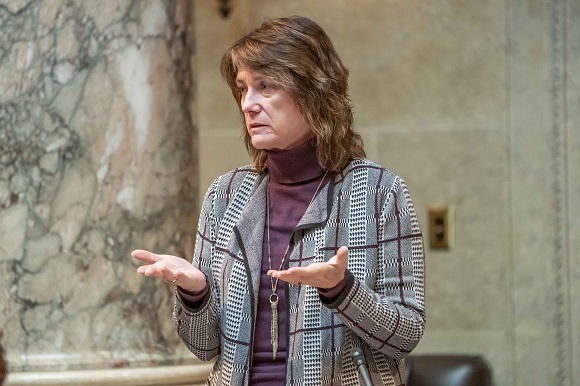|

October 22, 2021
Sandhill Crane Hunt: The Facts
Senate Floor Session
Employment of Minors
-------
|
Sandhill Crane Hunt: The Facts

Over the past week, I've heard from many constituents in the district, and around the state, about my bill that would require the Department of Natural Resources (DNR) to authorize a Sandhill Crane hunting season in Wisconsin. I also had the opportunity to watch as individuals and groups gave testimony on this piece of legislation in the Senate Committee on Sporting Heritage, Small Business and Rural Issues.
I will address some of the concerns below:
Hunters are trying to slaughter every animal in Wisconsin: Giving the DNR the ability to manage the Sandhill Crane population in Wisconsin is far from animal slaughter. Population control is beneficial to every ecosystem and the scientists at the DNR will be able to determine whether that is necessary. They can't make that determination unless a hunt is authorized.
There will be a fall hunt during the breeding season: There is nothing in our bill that calls for a fall hunt. The DNR will have full authority to decide when and where the hunt will take place in Wisconsin.
Farmers can already get depredation permits to shoot Sandhill Cranes: On average, 1,000 Sandhill Cranes are taken through depredation permits every year. According to statute, when a farmer shoots a Sandhill Crane with one of these permits, they must leave the carcass where it lies and let it rot. Farmers should have the ability to harvest these animals.
This hunt would decimate the Sandhill Crane population: According to the U.S. Fish and Wildlife Service's most recent estimates (2019), the three-year average of Sandhill Cranes in the Eastern Region (which includes Wisconsin) is over 94,000 birds, 34,000 higher than the recommended population levels determined in 2010. Currently, Kentucky, Tennessee, and Alabama are the three states in the Mississippi flyway that have expanded Sandhill Crane hunting opportunities. During the 2020-21 season, these three states harvested less than 2,000 birds combined.
There are already abatement opportunities for farmers: The abatement opportunities for farmers in Wisconsin are extremely inefficient. Currently, farmers are ineligible for damage prevention assistance and partial compensation through the DNR's Wildlife Damage Abatement and Claims Program until a hunt is authorized.
Where is the science behind this?: The state cannot legally create an animal management plan for any species until a hunt is authorized. This bill gives the scientists at the DNR the full authority to examine the current population and set goals for where the population numbers should be in order to maintain a healthy ecosystem. We're letting the scientists make this determination.
We should be protecting this beautiful species: The largest conservation community in the state of Wisconsin is hunters. Every time you purchase a permit to hunt an animal, funds from that purchase are put back into the conservation fund which is then used to develop, manage, preserve, and restore the population.
-------
|
Senate Floor Session

On Wednesday, the State Senate convened to take up a number of bills. A handful of the bills we passed are listed below:
SB 332: Expands the allowable work hours for 14 and 15 year olds to between 6:00 a.m. and 9:30 p.m. on a day preceding a school day, and between 6:00 a.m. and 11:00 p.m. on a day preceding a non-school day, as long as the employer and employee are not covered by the federal Fair Labor Standards Act.
SB 408: Adds catalytic converters to the state’s “proprietary articles” list, which currently covers items like copper and aluminum conductors and wires, metal beer kegs, manhole covers, metal grave markers, and railroad track components. By adding it to this list, it would create an ID requirement, proof of ownership, and a paper trail for scrap dealer’s catalytic converter purchases. A scrap dealer must either receive evidence that establishes that the seller lawfully possesses the catalytic converter or must document the sale and inform law enforcement that the sale occurred.
SB 503: Requires DHS to decertify any abortion provider that receives Medical Assistance (BadgerCare reimbursement) dollars. Providers must be certified as qualified healthcare providers in order to participate in the Medical Assistance program. While federal and state law prohibit taxpayer dollars from paying for abortions, abortion providers may be reimbursed for non-abortion services provided to BadgerCare participants. The bill specifically exempts hospitals that terminate a pregnancy for the physical health or life of the mother, or in cases of rape or incest.
SB 518: Modifies the definition of “environmental pollution” to include structurally-held contaminants - such as asbestos, man-made mineral fibers (MMFs), lead and other heavy metals, radon, polychlorinated biphenyls (PCBs), and others - to be an eligible Environmental Remediation Tax Increment Financing District (ERTID) project cost.
SB 538: Prohibits denying someone an organ transplantation based solely on their disability.
SB 591: Incorporates new information about the efficacy of certain chemical abortion procedures and a recommendation to contact a physician if they have questions about how they can continue their pregnancy to the states abortion informed consent requirement. Requires abortion providers to report additional information in their required annual report. The new requirements relate to the number of previous induced abortions, method of payment, reason for the abortion, method of the abortion, etc. Also requires reported information protect the anonymity and privacy of all patients.
SB 592: Requires the Department of Health Services (DHS) to compile educational materials and contact information for organizations that focus on congenital conditions and post that material on their website. If a test is performed that identifies a congenital condition, a physician who has administer prenatal or postnatal tests is required to ensure parents are provided these resources. Further, DHS must periodically review and update these materials.
SB 593: Prohibits an abortion from being performed solely because of the unborn baby’s race, color, national origin, ancestry, sex, or because of the diagnosis or potential diagnosis of a congenital condition or disability. Requires that physicians explain this to women seeking an abortion in addition to current information requirements. Further, it outlines procedures for a civil suit to be brought against a physician who knowingly performs such an abortion and specifies that if a physician has violated this bill, he or she must be investigated by the Medical Examining Board.
-------
Employment of Minors Passes

One of the bills mentioned above that passed through the Senate on Wednesday is my bill, SB 332, which deals with the employment of minors.
There are many small businesses throughout Wisconsin that rely on young people to fill out their workforce, such as in the tourism industry. Unfortunately, due to current law, these businesses are limited on how late in the day a minor can work for them. This was brought to our attention when a constituent who owns a mini-golf course let us know how frustrating it is that over the summer a minor can only work until 9pm, but the business itself is open until 10pm. This requires them to have older employees available to cover the last portion of the day, which can be extremely difficult for businesses that would otherwise rely on younger workers.
This bill will ultimately give businesses more flexibility when it comes to their employees, and will also help provide more opportunities for young people to make some extra money and build a responsible work ethic.
Currently, there are no restrictions on how late students can get home from a sports event - whether it be practice or games. My bill allows for students who are working, instead of playing sports, to find a job with much more ease, learn financial responsibility, and save for college.
-------
|
|
|